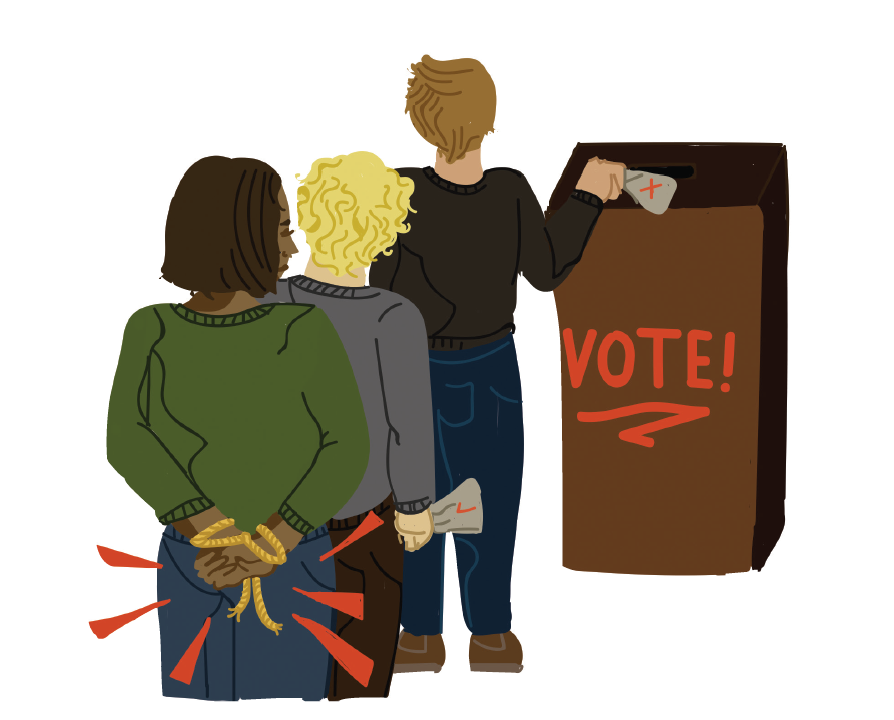Voters’ hands are tied and prevented from casting a ballot. This is representative of the larger voter suppression efforts occurring in Georgia as state officials purge voter rolls.
Georgia state officials, including Secretary of State Brian Kemp, have kicked hundreds of thousands of registered voters off voting rolls in an ongoing case of contemporary voter suppression.
When people hear the phrase “voter suppression,” thoughts of Jim Crow-era poll taxes, literacy tests and voter intimidation immediately jump to mind.
The Voting Rights Act of 1965 helped to put an end to these forms of disenfranchisement, but modern-day voter suppression continues to thrive, leading to a democracy where not every citizen is given an equal opportunity to cast their ballot.
As Republicans become more worried about maintaining their electoral majorities, and as White people make up a demographic majority in fewer and fewer counties, elected officials in Georgia have attempted to hold onto power by disenfranchising minorities and other voters in several ways.
One of the most harmful forms of contemporary voter suppression, yet one that often flies under the radar, is “voter purging,” in which citizens are removed from registered voter lists for a variety of reasons, including failure to participate in multiple elections, or a slight error on voter registration forms, such as a missing hyphen or one incorrect letter.
According to the New York University Brennan Center for Justice, in Georgia, 1.5 million voters were purged from the voting rolls between 2012 and 2016 — twice as many as during the previous four-year period. And in 2017 alone, 650,000 voters were taken off the rolls.
This voter purging unfairly targets Black and brown Americans and reduces the number of eligible voters in populations that tend to lean democratic.
“The reason that we see (voter purging) in minority communities is because many of our minority communities are typically in lower-income areas and are more transient populations,” Executive Director for Common Cause Georgia, a non-partisan advocacy organization for democratic participation, Sara Henderson said. “(Transient populations) could have moved from city to city and have duplicate registration, so (state officials decide they) need to take them off the rolls.”
With hundreds of thousands of fewer voters given the opportunity to cast a ballot, voter suppression has the potential to impact the 2018 midterm elections and elections for years to come. The effort it takes to re-register to vote may keep some people home from the polls, not to mention those who will show up to vote only to be turned away because they were unaware of their change in voter status.
Though some may argue these tactics are not voter suppression, and instead are important methods of protecting against voter fraud, this argument ignores data that shows that voter fraud in America is extremely rare. The Washington Post reported just four cases of confirmed voter fraud out of 135 million votes cast nationwide in the 2016 election. Claiming that voter purges protect against fraud is simply a sad excuse for disenfranchising voters.
Although voter purging is an important process for keeping up-to-date voter rolls, doing it improperly or aggressively like Georgia officials have done is an easy way to keep otherwise eligible voters from reaching the polls.
State officials should be doing everything in their power to ensure the people of Georgia are voting and participating in the democratic process — and voter suppression is counterproductive to the goal of civic engagement.
Georgia Secretary of State Brian Kemp must cease voter suppression efforts in order to ensure all citizens are given an equal opportunity to cast a ballot.
Voter suppression is an increasingly important issue in Georgia and voters need to be vigilant about checking their registration status and calling out their elected officials for attempts to suppress voter turnout.
More from Elena Gilbertson Hall
